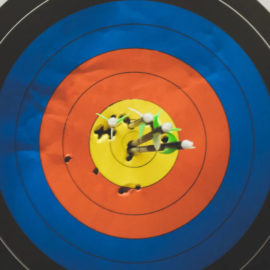

This article is an excerpt from the Shortform book guide to "Behave" by Robert Sapolsky. Shortform has the world's best summaries and analyses of books you should be reading.
Like this article? Sign up for a free trial here .
What is reciprocal altruism? Why do people feel compelled to reciprocate virtuous behavior?
Humans are innately reciprocal creatures because reciprocity has survival value. Even hunter-gatherer humans helped each other to contribute to the survival of the group. According to Robert Sapolsky, the author of Behave, altruism is encoded in our genes.
Keep reading to learn about reciprocal altruism and how this behavior evolved.
Reciprocal Altruism: Helping Each Other
What is reciprocal altruism? Reciprocal altruism is the theory that says that it’s advantageous for unrelated individuals to work together. To give a common example, grooming behavior is common among animals that live in groups—any member of the group will groom any other member, because making sure nobody’s carrying fleas or ticks benefits the whole group.
Sapolsky says that human society was founded on reciprocal altruism. Hunter-gatherer societies, the earliest known type of human civilization, relied heavily on nonrelatives working together to keep everyone safe and fed. Therefore, reciprocal altruism is in our genes at least as strongly as kin selection is.
Reciprocal Altruism and the Tit for Tat Strategy
In The Selfish Gene, evolutionary biologist Richard Dawkins uses the Prisoner’s Dilemma to illustrate how reciprocal altruism could have evolved. In the Prisoner’s Dilemma, two players have the choice to “cooperate” or “betray,” and each must choose without knowing what the other player picked. The possible results are:
- Both cooperate—both players gain a small number of points.
- One cooperates, the other betrays—the cooperating player loses a large number of points, the betrayer gains a large number of points.
- Both betray—both players lose a small number of points.
Professor Robert Axelrod hosted a Prisoner’s Dilemma tournament, where he asked people to design computer algorithms that would play hundreds of rounds of Prisoner’s Dilemma against each other. The winner was a simple program called Tit for Tat, which would always start out cooperative, then for each subsequent round it would copy what its opponent did the round before. It was mathematically impossible for Tit for Tat to win any individual match, but over the course of the tournament it racked up more total points than any other program.
Dawkins argues that the Tit for Tat program demonstrates why reciprocal altruism works better than more aggressive strategies: Aggressive individuals think of life as a zero-sum game—one where there must be a winner and a loser—and therefore they worry about defeating their opponents rather than simply doing well for themselves. However, in Prisoner’s Dilemma (and in life), all players can do well for themselves by cooperating and not worrying about “winning.”

———End of Preview———
Like what you just read? Read the rest of the world's best book summary and analysis of Robert Sapolsky's "Behave" at Shortform .
Here's what you'll find in our full Behave summary :
- An exploration of the myriad influences on human behavior
- A scientific look at why some people do such terrible things
- If there's really such a thing as free will






